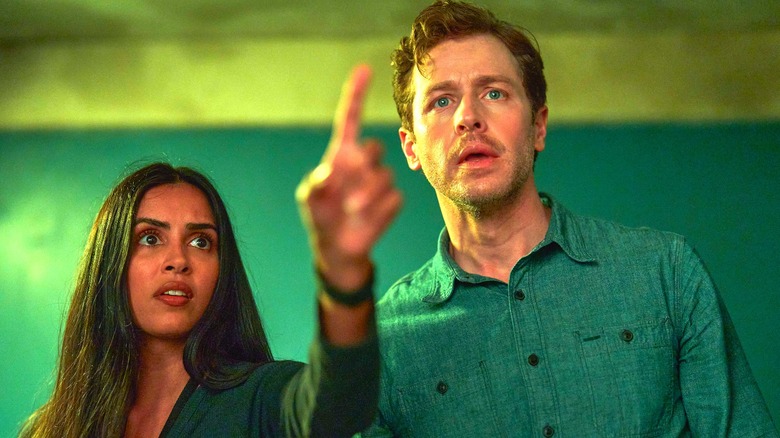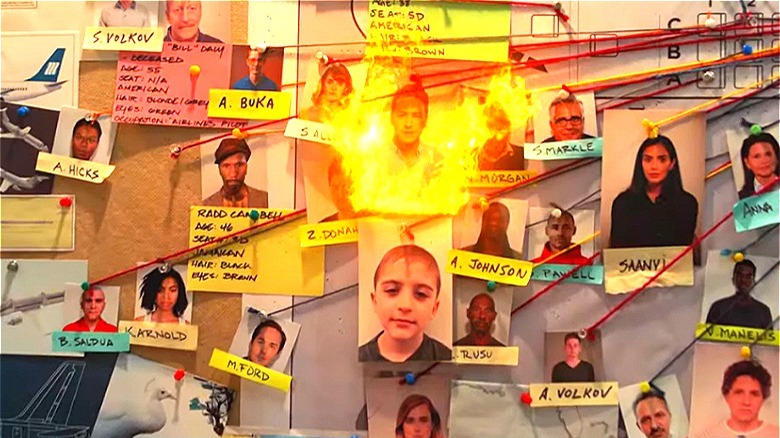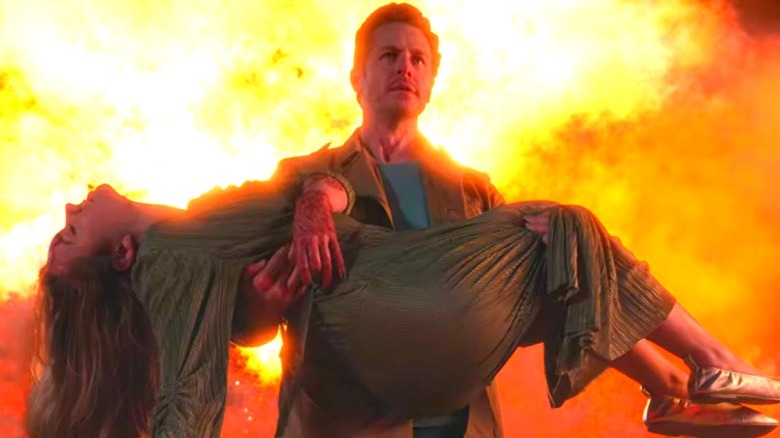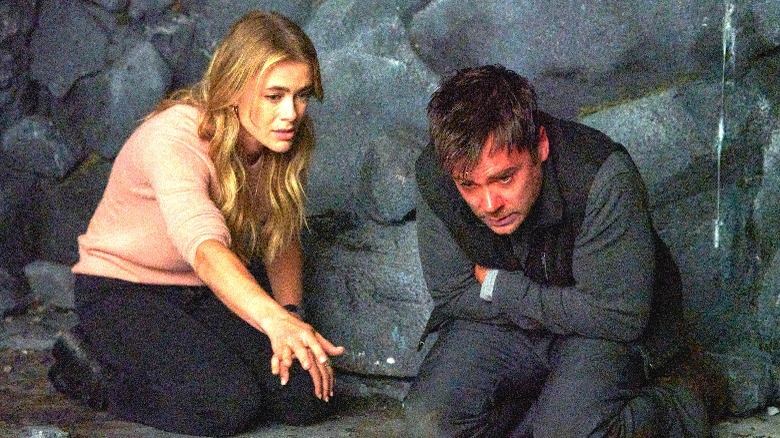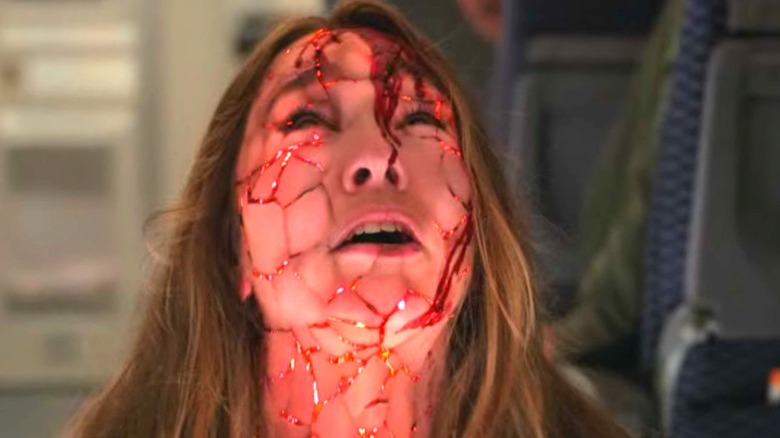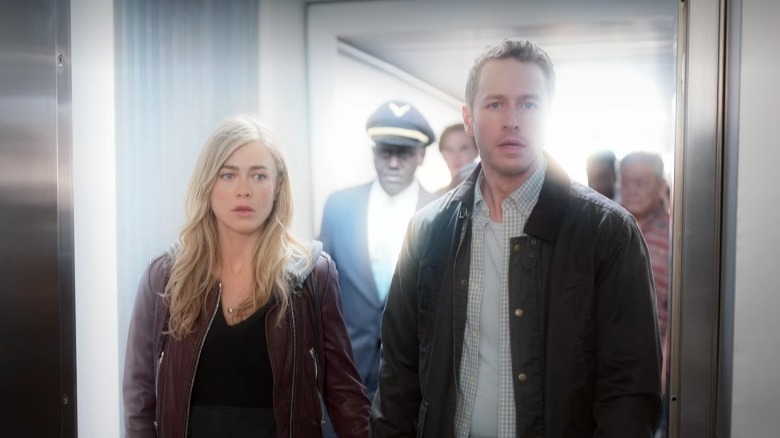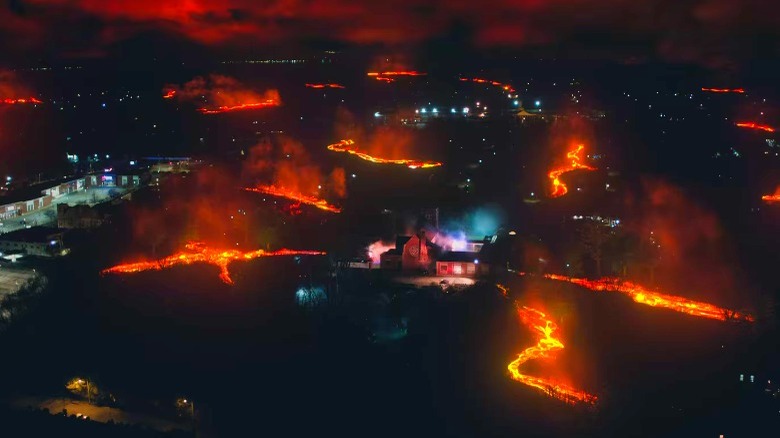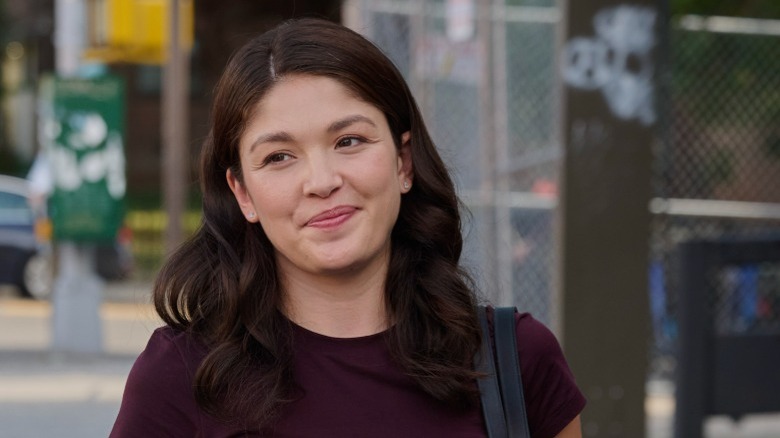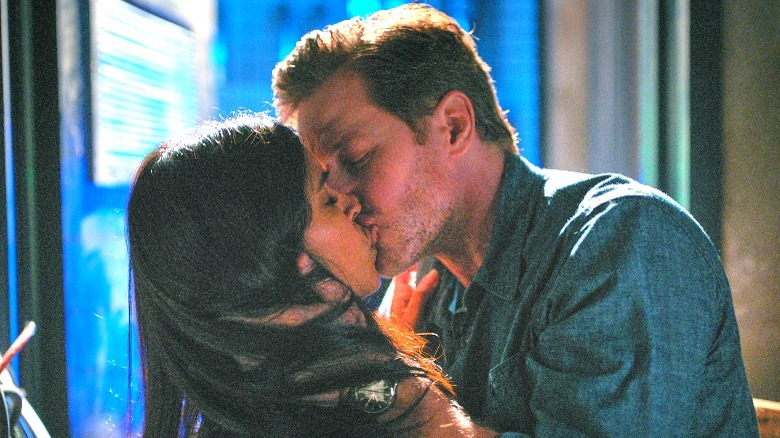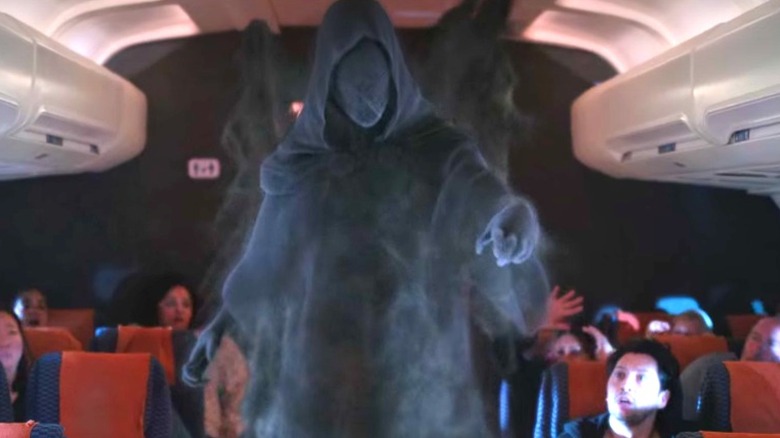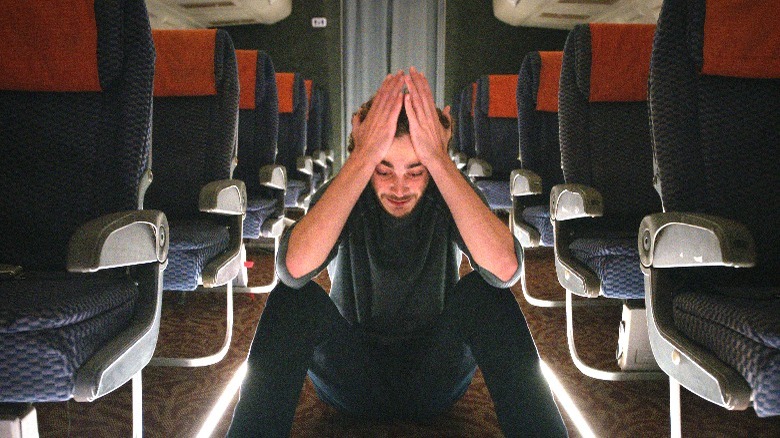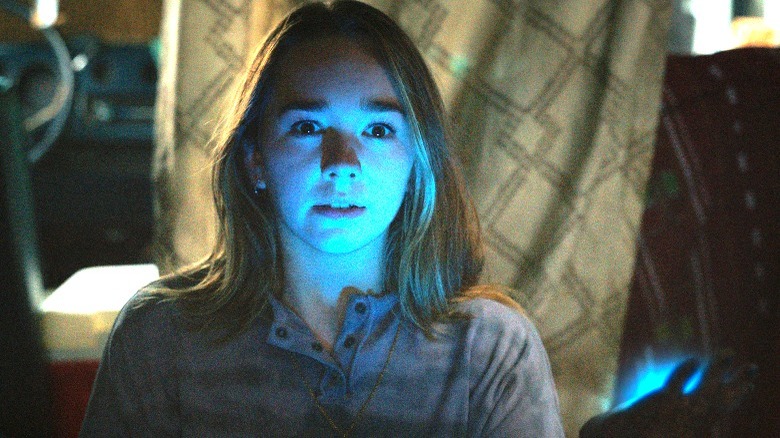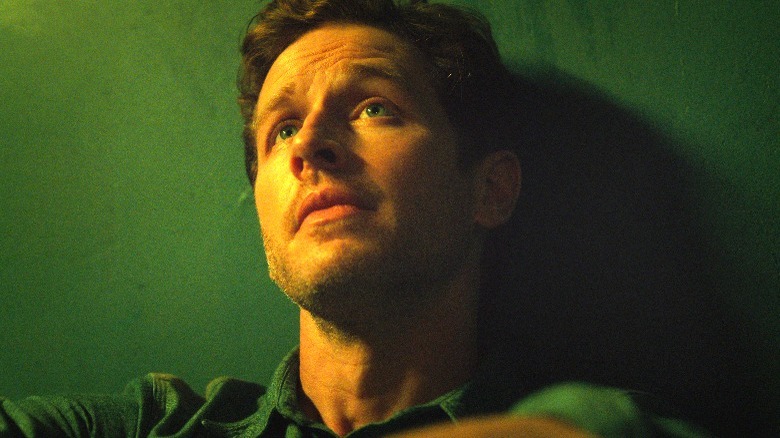The Ending Of Manifest Season 4 Part 2 Explained
With its endless stream of mysteries and moreish mashup of mythology, religion, and science, "Manifest" is one of those shows that fans love to obsess over; the soapy, character-driven storytelling is just icing on the genre-defying cake.
Now, following five years, a cancellation and a resurrection, the series has finally received the ending its fans deserved. Although not all questions were answered, the cast and crew of "Manifest" did their best to resolve most of the big ones, leaving viewers with a surprising amount of closure. For a show that has gone out of its way to torment, alienate, and even physically torture its characters, it ended on an unexpectedly positive note.
For those who hung on through four seasons of sapphire-encrusted shenanigans, it proved a rare satisfying ending in a cliffhanger-weary world. Whether you're a Benvi shipper or a secret Xer, get ready to rip off your glasses dramatically and take a closer look at the ending of "Manifest."
What you need to remember about the plot of Manifest
Grab your push pins and string, because you're going to need an evidence wall to rival Ben Stone's if you have any hope of following the plot of "Manifest."
The story follows the survivors of the New York-bound Montego Airways Flight 828, which misses its arrival time by half a decade. When the passengers finally arrive to find their loved ones have moved on, reclaiming their lives is hampered even further as they soon find themselves stricken with prescient but puzzling hallucinations that seem to nudge them toward certain actions.
Through the DNA of his cancer-stricken son Cal, Ben Stone begins to uncover a mythological component with the help of a few fellow passengers, including Dr. Saanvi Bahl and his sister, Detective Michaela Stone. Along the way, they face numerous obstacles including the U.S. government's efforts to weaponize the Callings (an anti-828 hate group that wants them dead) and a splinter group of 828ers' creepy end times cult.
Enter Angelina Meyer, the fragile narcissist whose religious trauma fuels her belief that she is some sort of avenging angel. The Stones realize the Callings are connected to the Divine Consciousness, channeled through the Omega Sapphire, and each survivor's return came with a built-in Death Date that kicks in if they are judged unworthy on that date. Michaela marries Zeke, a man she met in the Glow. Angelina kills Ben's wife, abducts his kid, gets infused with Omega Sapphire, and starts to bring about the End of Days.
What happened at the end of Manifest?
During the events of "Manifest" Season 4 Part 1, viewers learned that Angelina's sapphire-encrusted apocalyptic temper tantrum had summoned volcanic fissures across the region. Dubbed the Tri-state Fissure Event, the eruption would leave 700 dead.
Perhaps rightly believing the 828ers somehow responsible, the government rounds up every passenger they can find and crams them in a detention facility where they can closely monitor the Callings. Her adventures in kidnapping over, Angelina uses her powers to remotely tap in and kill Captain Daly and Fiona. She ends up in the detention center, where Ben tries to nuke her evil superpowers with Saanvi's anti-Calling vax. With the sapphire infused into her bloodstream, she lets out a supernatural scream that shorts out the other passengers' Calling antennas, causing the whole thing to backfire.
Eagan helps Angelina escape and restart her end times cult, eventually marrying her when he suspects she's about to kick him out. Back at the DC, a handful of minor Biblical plagues get the entire facility locked down and abandoned. Drea Mikami drills into the building, and the passengers work to complete every last Calling ahead of the final Death Date. As the planet erupts, Cal sacrifices himself to summon the intact Flight 828 plane. The remaining passengers board the plane and fly over the apocalypse into the Glow to receive their judgment. Those that pass the test land in Queens, restarting their lives in 2013 with the knowledge of everything they've experienced.
It was all about humanity's potential for good or evil
Early on in Ben's investigations, he realized failing to follow the Callings came with a cost. But it was his daughter Olive who discovered the truth behind the fated flight's disappearance and its connection to the Callings, a puzzle pieced together with her brother's visions of dragons, peacocks, volcanoes, and stars. During their lost time, Flight 828 was pulled into the glowing blue light of the Divine Consciousness, an otherworldly plane where past, present, and future are merely irrelevant constructs. In that space, they receive visions telling them what they're meant to do before getting sent to reclaim their lives, hopefully guided by that knowledge.
They soon learn that they weren't the only ones to receive it as they encounter others pulled into the glow, a cross-section of humanity snapped up by the Divine Consciousness to stand trial for the human race. Everyone who communed with the Divine Consciousness has a choice to make. Some use that knowledge to help others and sacrifice their own happiness for the greater good, while others — like James Griffin and the Meth Heads — use it for their own gain, or even to harm others.
It was also about redemption
Everyone in the test sample is ultimately judged for their actions. When Zeke sacrifices himself to save Cal, he's rewarded with more time, while Griffin drowns on land and the Meth Heads are destroyed by the shadow. As the series draws to a close, the details of how the Lifeboats work aren't necessarily all understood, but one thing is certain: harm begets harm, while sacrifice yields reward. But at least until the final judgment, there's always time to change one's ways, and redemption — particularly through service and sacrifice — proves a powerful theme throughout "Manifest."
For Zeke, redemption meant a chance to bring positivity to the world after all the pain and suffering he had experienced and caused through his own struggles with addiction and failure to forgive himself. After his return, he dedicated his life to helping others both through the Callings and through his own work as an empathic social worker.
For Paul Santino, it meant redemption from the harm he caused Helen Doyle as an abusive husband, and for Saanvi, it meant redemption after her accidental killing of the Major. For Eagan and Adrian, redemption would come at the 11th hour — as the pair were facing judgment on the plane, their willingness to sacrifice themselves for each other led to their own redemption. Not everyone was willing to make such a sacrifice, and 11 of the passengers, including Angelina, perished in the final judgment.
It might feel familiar to Lost fans
"Manifest" has drawn many comparisons to "Lost" since the beginning of its run, and the similarities go far beyond the large cast and premise of a mysterious plane crash dooming its passengers and crew to a purgatory-like existence, all in a world plagued by mysterious and supernatural events.
If the show felt familiar during its first three seasons, however, the closing half of Season 4 drove the point home even further. After the 828 passengers are judged and the Divine Consciousness deposits those who are still left at JFK, they're left with the knowledge of everything they've just experienced in a timeline where none of it has happened.
"We bend over backwards to try to make clear that everything you've watched happened," showrunner Jeff Rake told Netflix. "This is real. We're not trying to mess with people's minds. It's all real. This all happened."
But now that they're in a different timeline, the distinction between reality and the "it was all a dream" flash-sideways of "Lost" seems purely academic. Just like "Lost," which brings its passengers back together in the afterlife, "Manifest" lands with its passengers forever bonded in the shared knowledge that together, they faced judgment on behalf of and saved all of humanity.
The Biblical plagues prove somewhat anticlimactic
"Manifest" goes to great lengths to emphasize its mythological components, particularly those of Judeo-Christian origin. Biblical elements are woven throughout the series (down to the flight number 828, an allusion to the Bible verse Romans 8:28) to the point that some viewers questioned whether the show was secretly religious propaganda.
When Saanvi would later be handed what she strongly suspected was a fragment of Noah's ark, those Sunday School suspicions were all but confirmed. So, the discovery of the Death Date and the oncoming apocalypse would surely portend some End Times horrors straight out of Revelation's darkest verses, right?
Whether it was due to time constraints, budget or the writers' lack of focus, only the Divine Consciousness knows for certain. But the Biblical plagues present in the final half of the show's final season were pretty lackluster, particularly after Angelina summoned a subterranean volcano in the first half. In her efforts to bring down the witnesses, Angelina manages to call forth a small swarm of locusts, give Daly some boils, and turn some water red ("Throttle"). But just as fast as they come, the omens fizzle out, and it's later revealed that the red river was just algae to drive the point home.
Redditors were quick to point out that the plagues mirrored 3 of the 10 plagues faced by the Egyptians in Exodus, with the others being frogs, hail, darkness, lice, deadly flies, locusts, darkness, and the death of all firstborn sons — something that wouldn't bode well for Cal.
Drea seals her place as the real MVP
The only thing in the "Manifest" universe harder to follow than the Callings is the incessant bed-hopping of Jared Vasquez, the living embodiment of the phrase "love the one you're with." To that end, the handsome detective has plenty of love to give whether he's with Michaela, Lourdes, the Xers' bartender, or the Major's daughter.
His relationship with Michaela runs deep, but their on-again, off-again fireworks pale in comparison to the profound and enduring connection between Zeke and Michaela. It's hard to imagine a guy like that finding his soulmate, especially since most of Jared's lovers end up as dropped storylines. But then, it's hard to imagine anyone as perfect as Drea Mikami.
Having proven herself invaluable to the Stones over the past two seasons, Mikami steps up even more in the final half of Season 4. The grandchild of Japanese Americans who were detained by the U.S. government during World War II, Mikami has never been afraid to fight against an unfair system, whether that means sneaking into a coworker's computer or drilling into a government detention center. She has nothing but love for Mick despite their romantic rivalry, and she's fine with moving out of the way when they rekindle the old flame despite being fully pregnant with Jared Junior. That's saying nothing of her great taste in pastries and handbags. Fearless, humble, and super hot, Drea is the true hero of "Manifest."
One fan-favorite ship finally sets sail
Ben Stone's family is everything to him. HIs relationship with Grace has always been the cornerstone of that family, which is why they worked so hard to keep their marriage strong after his years-long unexplained absence, despite Grace having accepted his death and moved on with her life. It's also why Ben all but stops living after her murder, holing up in his hermit cave and suffocating under the weight of his grief beard while what's left of his family falls apart.
Despite this clear commitment to his family, the undeniable chemistry with bi queen Saanvi is evident from early on in their relationship, and Benvi shippers couldn't get enough. They were finally given a kernel of hope in "Romeo," when Ben initiated a fake first kiss to help pull off the pair's nursing home investigation, to be later duplicated in the full-blown closet snogging sesh of "Bug Out."
The writers found a way to move Benvi past fakeout makeouts without tarnishing the perfect love between Ben and Grace when the pair decided to blow off all the steam they'd been building up since first landing, all while the clock ticked down to the apocalypse. As Josh Dallas told TVLine, the culmination of their super sexy friendship gave them a chance "to live outside of everything that was going on around." Why the heck not? As one Redditor put it, "Bang one out before the end of the world? No that does make sense."
The entity judging them isn't fully explained
Even if the passengers understand they're being judged in the Divine Consciousness by the end of "Manifest," there are still plenty of burning questions remaining by the time they finally land in Queens. Although Saanvi comes to realize they've been chosen as part of a random sample for a trial, the passengers never learn why they needed to face judgment or by whom.
As Pilot Amuta flies them through the Divine Consciousness, a shadowy figure appears that looks a good deal like the shadow who engulfed the three Meth Heads on their judgment day. Faceless, winged, hooded, and dark, it transforms from a Lostian smoke monster to loom before the passengers from the center of the plane, silently passing judgment on them all. Having had enough of the Divine nonsense, the Stones and friends finally confront the entity, making their case for their own salvation and rebuking the shadow until it disappears.
Although the show never fully explains this creature, it seems far more malevolent than any Divine Consciousness — but then, it might be perfectly on-brand for a deity famous for killing firstborn sons. Some fans theorized it was the Grim Reaper or the Angel of Death, with others pointing out that making one's case to God has Biblical roots dating back to Sodom and Gomorrah.
Cal's role remains an unsolvable head-scratcher
Many of the questions still lingering past the conclusion of "Manifest" revolve around Cal's role in everything. Shortly after landing the first time, Cal begins to show signs that he's far more in tune with the Divine than the rest of the passengers. Over the course of the series, his acute visions become central to helping the others solve the Callings. After discovering the Death Date, he is beckoned to the tailfin, which he touches to restore the plane.
After he later reappears, aged-up after communing with the Divine Consciousness, he inherits a sweet-looking, sapphire-infused dragon scar that allows him to connect to the glow, something he's eventually able to do just by focusing. By the end of the series, it's Cal who finally brings back the plane by stepping into the glow one final time.
Even though Flight 828 was chosen as a random sample, there's a sense that Cal in particular was selected by the Divine Consciousness for reasons that aren't clearly laid out in the series. The mechanics of how he connected with the tailfin and the reasoning behind his temporary age-up are also left unexplained. If there's something a little unsettling about the fact that he suffered so much only to come back and have to go through cancer treatment again, at least viewers can rest assured he is one of the few who can't seem to remember their adventures in the Divine Timeline.
The ending leaves a lot of loose ends
All the questions surrounding Cal are just the beginning of the unsolved puzzles fans are left with at the end of the messy supernatural goulash that was "Manifest." One of the most pressing is the notable absence of 11 passengers upon the flight's final landing at JFK — including Captain Daly, something that doesn't go unnoticed by law enforcement.
Although the passengers are grateful to finally debark after what has amounted to (give or take) about a decade by the time it's all over, investigators are already showing up to look into the mystery of the missing passengers. Judging by the reception 828 got when they finally landed the first time, it's hard to imagine the survivors won't get called in by a rather accusatory Agent Vance at some point.
Equally puzzling is where some of the passengers came from. Moments after landing, Michaela and Ben watch as passengers they lost along the way like Fiona and Violet pour out of the sky bridge. As Violet bumps into T.J. and they introduce themselves, it's unclear how much or what the resurrected survivors remember or whether they will all keep in touch. Judging by Michaela's interaction with Zeke, conveniently revealed to be an airport cabbie who was present as their plane arrives and doesn't remember anything, there's a sense that they'll all have some dancing to do. Perhaps most pressing of all, no one knows if they finally got their long-overdue $400 vouchers.
Josh Dallas thinks a spinoff is possible
The fact that "Manifest" fans got to see the show through to the end was something of a divine intervention in and of itself. Against long odds, Netflix proved willing to bring back the series long enough to give it a fitting end after its cancellation on NBC left fans screaming for more, so it's not entirely crazy to think they could perform another miraculous resurrection in the future.
Josh Dallas thinks — or at the very least, hopes — it could be in the realm of possibility. As the actor told The Hollywood Reporter, "I think there's major sequel or spinoff potential here."
According to Dallas, a "Manifest" spinoff could explore the next generation, following up with Eden and some of the younger passengers or delve into the world the passengers find when they arrive. It's a sentiment echoed by creator Jeff Rake, who told Distractify, "When you're lucky enough to have fallen into a relationship with your characters and with your fans, it can't help but lead a greedy showrunner to think... 'would there be more story to tell about these characters?' And so, I certainly spent a lot of time dreaming up potential stories for the beyond."
